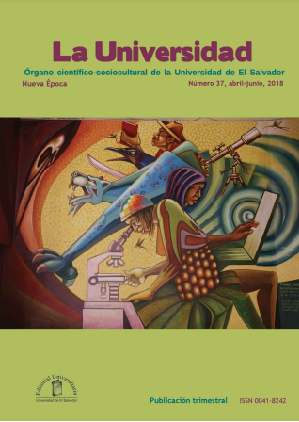Clementina Suárez
la palabra subversiva
Keywords:
Anti-essentialism, Androgyny, Identity construction, Subject in process, Social denunciationAbstract
In this essay we will analyze four poems by the Honduran poet, Clementina Suárez. The speaker is a subject in process according to Julia Kristeva’s theory; it represents the resistance and rebellion of women through antiesentialism, and it expresses an androgynous voice in her poetry. In this alternance between feminine and masculine tones, the poet condemns social injustices and sexism. By showing gender ambiguity in her poems, Clementina presents the marginality in which women lived in the social and intellectual context of her time.
Downloads
References
De Diego, E. (1992). El andrógino sexuado: eternos ideales, nuevas estrategias de género. Madrid: Visor.
Canillas, L. (2008) Señales de la androginia en la cultura y el arte. (Trabajo de grado, Instituto Universitario Nacional del Arte). Recuperado de: http:// www.arteuna.com/talleres/tesis/LoreanaCanillas.pdf
Kristeva, J. (1984). Revolution in poetic language. New York: Columbia University Press.
Kristeva, J. (1998). The Tel Quel Reader. Ffrench, P. & Lack, P. (Eds.). London: Routledge.
Moi, T. (1999) Teoría Literaria Feminista. España: Cátedra.
Pineda de Gálvez, A. (1998) Honduras mujer y poesía: Antología de poesía escrita por mujeres 1865-1998. Tegucigalpa: Guardabarranco.
Platón (2006). El banquete. Madrid: Alianza Editorial.
RAE. (13 de mayo de 2018) Diccionario de la lengua española. Recuperado de: http://dle.rae.es/?d=2aawiJY
Suárez, C. (2012) Poesía completa. Tegucigalpa: Editorial Universitaria.
Downloads
Published
Issue
Section
License
Copyright (c) 2021 Authors who publish in Revista La Universidad agree to the following terms: Authors continue as owners of their works, non-exclusively assigning dissemination rights to La Universidad Journal under the standards of the Attribution-NonCommercial-ShareAlike License: CC BY-NC-SA 4.0. This license allows the use of a work to create another work or content, modifying or not the original work, as long as the author is cited, the resulting work is shared under the same type of license and has no commercial purposes(https://creativecommons.org/licenses/by-nc-sa/4.0/deed.es).

This work is licensed under a Creative Commons Attribution-NonCommercial-ShareAlike 4.0 International License.





